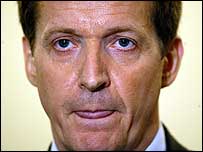An Iraq Inquiry?
Inquiry into Iraq conflict is likely, says Johnson
By Colin Brown, Deputy Political Editor
Published: 18 May 2007
An inquiry into the war in Iraq could take place in a Gordon Brown government, Alan Johnson - the front-runner for the deputy leadership - has told supporters.
The Education Secretary told a hustings meeting that an Iraq inquiry which has been resisted by Tony Blair was likely to happen when the Prime Minister stands down. His allies said he believes it could help to draw a line under the mistakes of the Blair years.
"Alan thinks there probably will be an inquiry," said one of Mr Johnson's friends. "He thinks there is a mood out there for one, whatever you think about the rights or wrongs of having an inquiry. He didn't say it would come to any definite conclusion but he thinks there will be an inquiry. We need to draw a line under Iraq."
[]
http://news.independent.co.uk/uk/politics/article2556484.ece
By Colin Brown, Deputy Political Editor
Published: 18 May 2007
An inquiry into the war in Iraq could take place in a Gordon Brown government, Alan Johnson - the front-runner for the deputy leadership - has told supporters.
The Education Secretary told a hustings meeting that an Iraq inquiry which has been resisted by Tony Blair was likely to happen when the Prime Minister stands down. His allies said he believes it could help to draw a line under the mistakes of the Blair years.
"Alan thinks there probably will be an inquiry," said one of Mr Johnson's friends. "He thinks there is a mood out there for one, whatever you think about the rights or wrongs of having an inquiry. He didn't say it would come to any definite conclusion but he thinks there will be an inquiry. We need to draw a line under Iraq."
[]
http://news.independent.co.uk/uk/politics/article2556484.ece




















